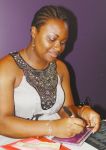by M. Abdul-Quaiyy
“I want young Black girls to know that you do matter. You are loved. You are not invisible,” said Brittany McBryde in her recent documentary “The Image of Black Women.”
 |
| DVD SIGNING—Brittany McBryde signs DVDs of the film “The Image of Black Women.” (Photo by J.L. Martello)
|
As a filmmaker McBryde used a combination of her own personal experiences and interviews of other African-American women to compile a well-rounded opinion of how stereotypical images of African-America women are misrepresenting their experiences.
The film premiered at the August Wilson Center for African American Culture and drew a diverse crowd. The audience, even though racially and generationally diverse, was primarily made up of African-American women.
The film commences with a clip from the 1963 documentary, “Take this Hammer,” where activist and author James Baldwin comments, “What you say about somebody else reveals you. So what I think of you is being dictated by my own psychology. I’m not describing you when I talk about you, I’m describing me. And I didn’t invent the nigger. And I have always known that I am not a nigger. So, if I am not the nigger then who is? I am not the nigger, it is you.”
A very strong and racially charged statement to begin a film, however, Baldwin was responding to the idea of how, historically, Blacks were referred to in America. It was culturally and publically acceptable and used as such by predominantly White Americans. Baldwin’s statement implies that the person using that word, specifically, as an insult for a darker skinned person is perpetuating his or her own negative self- beliefs.
Beginning the film with the clip of Baldwin lends credence to the notion that African-Americans, even 49 years later, could still be referred to as such and, even more disturbing, still subtly represented as such in the media. Unfortunately, the predominant images that are glorified and the epitome of stereotypes of African-Americans in the media are those rooted in negative and vulgar behavior, McBryde said.
The image of African-American women, specifically, is not only thoroughly discussed throughout the film but also how those negative stereotypes are perpetuated in the media. All of the persons interviewed in the film were very candid about their experiences as Black women and their responses to the stereotypes.
Celeste Taylor commented that she was “looked at as though I am entertainment,” due to her hair and several other features that made her physically different.
The boom of reality television shows has given birth to a new pop frenzy and craze. During the film’s discussion such shows mentioned as advancing the stereotype of “the angry Black woman” were: “Love and Hip Hop,” “The Bad Girls Club,” and “Real Housewives of Atlanta.” These shows follow women, who are mostly African-American, in their daily lives.
The mentioned shows are known for being infused with drama. The level of tension, conflict, potential violence, and sometimes violent outbreaks, between the cast members are a never ending theme throughout the show’s season.
Tanya Harris Redwood commented in the film, “Reality shows are dangerous. Promotes the stereotype.”
Others agreed that images like fights previously described do not reflect who they are and how they conduct themselves. These images are representing a particular urban and inner-city culture that reflect a particular demographic and how they are stereotypically known to act, but is not necessarily reflective of the whole. However, when women who own businesses or are married and do not necessarily embody the stereotype, are seen on television portraying themselves in stereotypical ways, over and over, then there is an unbalanced view of how all African-American women are seen and how they believe themselves to be.
Redwood continued to comment in the film, “These stereotypes don’t come from nowhere; people put them out on a pedestal. That’s the problem.”
Those African-American women who do not fit the stereotypes are asked why they are not acting in this particular way. Michelle Hunter commented during the film that when she strived to excel in school, she was called ‘White.’ Her African-American peers called her this because she spoke grammatically correct, “I’m speaking proper English, you should try it sometime,” she would respond.
Kathy Humphrey commented that the, “less intelligent stereotype” allows for African-American women to be received as less. “Black women have everything, they can be more. Educated. Affluent. Successful,” she said.
“We buy into the stereotype of the media. Black women constantly have to humanize ourselves,” McBryde said.
Wilkinsburg Police Chief Ophelia Coleman commented that when she is traveling on public transportation or walking “People are grabbing their purses and flinching at me. Why are they flinching? Not because I am a police officer but it’s because of something else.”
Even though the film focused on the concerns about the negative misrepresentation of African-American women, they were still hopeful. Redwood commented, “Countless number of women are doing things like Michelle Obama, that’s positive energy.”
(For more information on the documentary “The Image of Black Women” and upcoming work from Brittany McBryde, please visit https://theimageofblackwomen.com.)